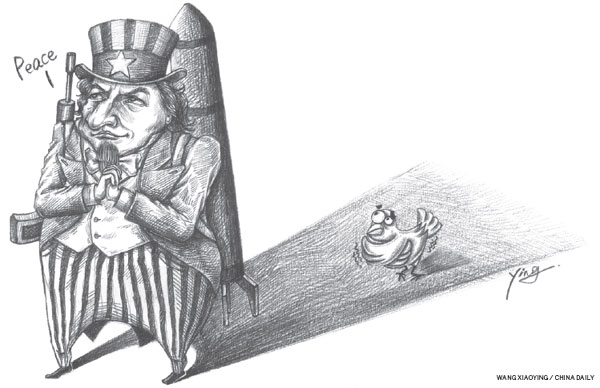Peace-loving China poses no threat to US
By Shen Dingli (China Daily) Updated: 2015-03-16 08:13

More importantly, China has its own assessment of security threats, which are not limited to the US' spending spree. Apparently, Beijing feels threatened from some of the US' allies too.
While Washington accepts the one-China policy, it continues selling weapons to Taiwan, threatening Chinese interests. Besides, after "reverting" the jurisdiction of China's Diaoyu Islands to Japan in 1972, the US declared last year that it would back Tokyo in the dispute with Beijing in the name of common defense, further challenging China's sovereignty.
After occupying Iraq for eight years, the US withdrew its troops without apologizing or compensating for the mess it has created in that country, let alone bringing to justice those who launched and engineered this massive humanitarian disaster. This US act has caused more damage in Iraq, including the emergence of the Islamic State group, than any Iraqi government possibly could.
True, the US has not always been a threat to the world. The dropping of atomic bombs on Hiroshima and Nagasaki 70 years ago made complete sense given the then aggressive Japanese empire. But now the US is appeasing Japan, which under Prime Minister Shinzo Abe is hell-bent on whitewashing its war crimes. Washington's shortsightedness can only change its common defense agreement with Tokyo for offensive end, and thus push Beijing to hedge more seriously so long as the situation warrants.
Therefore what the US should do is not to point an accusing figure on China, but truly promote Sino-US ties by reflecting on itself and its allies. Only when the new type of major country relationship is built up can the world peace be better safeguarded.
The author is professor and associate dean of Institute of International Studies, Fudan University.

I’ve lived in China for quite a considerable time including my graduate school years, travelled and worked in a few cities and still choose my destination taking into consideration the density of smog or PM2.5 particulate matter in the region.











